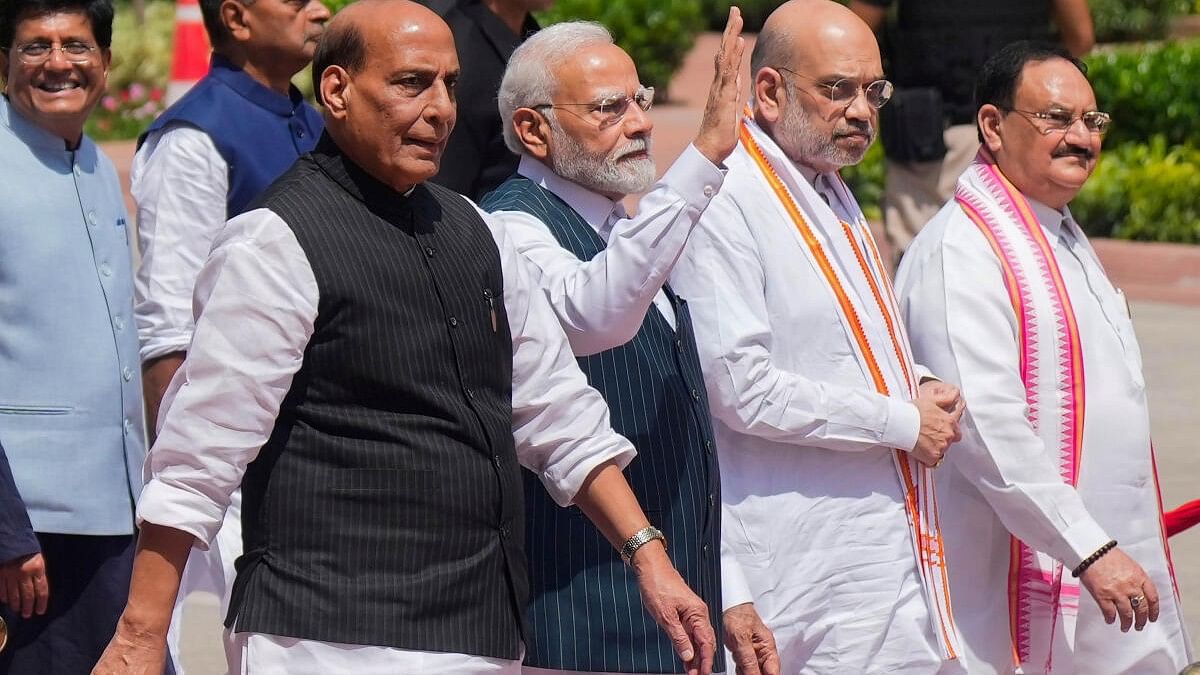
PM Narendra Modi, flanked by Rajnath Singh on the right, and Amit Shah and J P Nadda on the left.
Credit: PTI Photo
There are three ways in general of looking at caste enumeration: negatively, as an exercise that reinforces the predatory caste system; neutrally, as something that recognises a reality that cannot be ignored; or, positively, as a recognition of a social evil that can be made a tool to root out its injustices.
At the current juncture of Indian history, the lattermost is the most judicious way of viewing caste enumeration. The Bihar government’s caste census — we will not quibble over semantics in the manner Bharatiya Janata Party (BJP) leaders are doing — and the publication of its results on October 2 is, therefore, a way forward in forging greater social and economic equality in India.
The coalition government formed by the Janata Dal (United) and the Rashtriya Janata Dal (RJD) has been working on the caste census for some time. It has been part of their political programme. That it has been published now is partly a result of delays caused by judicial interventions. So, uncomplicated allegations that this is just a political ploy, timed with a view towards the 2024 general elections, don’t wash. We’ll return to the politics surrounding the census in a bit.
The caste census itself is revealing. Just over 36 per cent of Bihar’s population belong to the Extremely Backward Classes (EBCs); 27.13 per cent to the Other Backward Classes (OBCs); 19.65 to the Scheduled Castes (SCs); and other groups deserving reservations have a smaller presence. The ‘forward castes’ constitute only 15.5 per cent of the population. Adjusting for the total minority segment of the population, this figure is even lower.
This, obviously, has major connotations as Chief Minister Nitish Kumar, Deputy Chief Minister Tejashwi Yadav, and the grizzled and ailing RJD veteran Lalu Prasad (the master strategist of the politics of social equality), have pointed out. The 50 per cent cap on reservations must be revisited. Not only will there be concerted pressure to increase quotas for the deprived, which constitutes such an overwhelming majority, there will also be louder voices calling for more targeted social schemes using the newly available data.
Congress leader Rahul Gandhi, Lalu Prasad, and Bahujan Samaj Party MP Danish Ali have already coined what promises to be the defining slogan of the times: ‘Representation proportional to share in population’. This idea will be difficult to resist. Other states will now be under pressure to execute some credible form of caste enumeration, especially those in the north Indian heartland — Jharkhand, Uttar Pradesh, Madhya Pradesh, Chhattisgarh, Haryana, and Rajasthan. Locally dominant communities such as the Jats and Gujjars will also seek recognition as backward groups.
Karnataka and Odisha will be under pressure to release the figures of the caste censuses, even if they are not as exhaustive as Bihar’s. But the most intense pressure will be piled on the Union government, which has blocked the release of the data collected by the United Progressive Alliance (UPA) government’s 2011 socio-economic caste census, especially because it has refused to conduct the decennial census of 2011. It will be loath to do so because the BJP thrives on grey areas that confute facticity, which enables it to deploy its weapon of falsehoods most effectively.
But there is a political dimension that creates an imperative. BJP leaders might try to put a brave face and dismiss the Bihar census as flawed or irrelevant, but they will be aware that it changes the political dynamic of the heartland. The BJP has thrived electorally by consolidating the non-Yadav backward castes, in both the ‘other’ and ‘extremely’ categories, with its recourse to the toxic rhetoric and practice of exclusivist majoritarianism. If it fails now to confront the politics and materiality of social equality, the social coalitions it has stitched together may well fall apart.
The Karnataka elections have shown that the politics of welfare is salient and persuasive. The Madhya Pradesh government’s scramble to create social schemes given its electoral vulnerabilities, has shown up Prime Minister Narendra Modi’s freebie jibes for what they are: puerile and risible. This welfare politics will now have to be inflected to meet the exigencies of the new data on backwardness.
Politically, there is no doubt that the Opposition — the Indian National Developmental Inclusive Alliance (I.N.D.I.A) — has scored a goal. The BJP is scrambling. We’ll have to see whether its response will be to try and meet social and economic goals, or ratchet up its hatemongering rhetoric and engineer further social division and conflict.
(Suhit K Sen is author of ‘The Paradox of Populism: The Indira Gandhi Years, 1966-1977’.)
Disclaimer: The views expressed above are the author's own. They do not necessarily reflect the views of DH